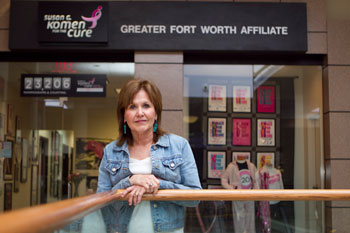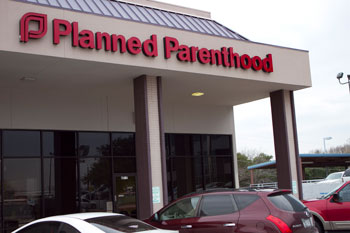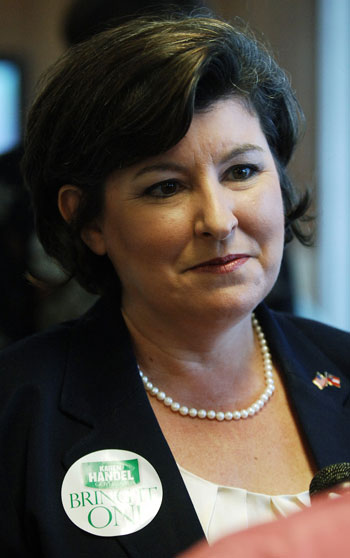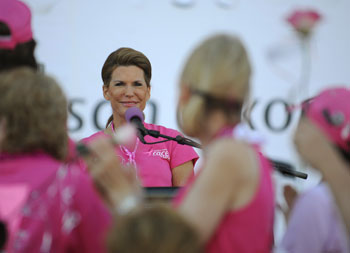“It’s a slippery slope, trying to pit women against women. There is no fiercer bond, no more irrevocable trust, than the common purpose we feel.” — Annabelle Massey Malloy, award-winning Fort Worth writer, regarding the Komen-Planned Parenthood fiasco.
 Women and men marched with their fingers last week in one of the most stunning examples of the power of social networking since Facebook and Twitter were invented. On Feb. 1, the Susan G. Komen for the Cure foundation announced that Planned Parenthood would no longer be eligible to apply for grants from the Komen group because Planned Parenthood was under “investigation” by a Congressional committee trying to determine if it used any federal funds to provide abortions for poor women.
Women and men marched with their fingers last week in one of the most stunning examples of the power of social networking since Facebook and Twitter were invented. On Feb. 1, the Susan G. Komen for the Cure foundation announced that Planned Parenthood would no longer be eligible to apply for grants from the Komen group because Planned Parenthood was under “investigation” by a Congressional committee trying to determine if it used any federal funds to provide abortions for poor women.
Overnight, a firestorm of protest sprang up, led primarily by women on social networks, with reactions like that from Aracely Chavez of Fort Worth, a local Planned Parenthood volunteer who warned that “Not one penny more for Komen [will come] from me.”
Several top Komen officials resigned in protest. And Planned Parenthood raised $3 million in donations from outraged supporters, many of whom were also longtime Komen volunteers and financial supporters.
Three days later, Nancy Brinker, founder and CEO of the Dallas-based breast cancer charity, humbly announced it was rescinding its decision and would again consider providing grants to Planned Parenthood for its breast cancer-related work.
The genie won’t be put back in the bottle so easily — or perhaps ever. In Fort Worth, a close working relationship between the two organizations seems likely to continue, despite the intense feelings of Chavez and others
“One thing I want our supporters to know: We affiliates had no input into this decision [to defund Planned Parenthood],” said Ann Greenhill, executive director of Greater Fort Worth Komen Race for the Cure. “We were as surprised as everyone else,” she said, and she called the national organization “naïve” for not foreseeing the backlash.
But nationally, the Komen decision, and the aftermath that continues to unfold, could change Komen and the larger fight against breast cancer irrevocably.
Komen, a savvy and influential nonprofit founded 30 years ago by Dallas native Brinker after her sister died of breast cancer, has done more to make “breast cancer awareness” a household phrase through the power of the color pink than any other cancer-fighting group. It has saved countless lives by bringing breast cancer out of the shadows and into the public conversation and by providing funding for research and breast screenings, the latter often through its partnerships with local Planned Parenthood clinics.
But now the solid pink line seems to have been broken. Critics have come forward to complain about the organization’s close ties to powerful, often polluting corporations, its past role in working against health initiatives that many believe would help women, and the extent to which right-wing politics holds sway within the organization.
 Not surprisingly, there’s also a second backlash — among abortion opponents who apparently thought Komen was on their side.
Not surprisingly, there’s also a second backlash — among abortion opponents who apparently thought Komen was on their side.
Critics immediately questioned the role of Karen Handel, the group’s vice president for public policy, in the decision to defund Planned Parenthood. Handel, a former candidate for the Georgia governor’s office, had pledged to eliminate grants to the birth control and women’s health service organization if she had been elected. The Komen organization initially denied any right-wing pressure in its defunding decision but had to quickly step back from that.
Then on Tuesday, Handel herself resigned — in protest over Komen’s reversal of its decision to defund Planned Parenthood — and made it plain that she had been central to the funding cut-off.
“I openly acknowledge” the integral role she played in formulating that policy, she said in her resignation letter, according to news reports. “I continue to believe that our decision was the right one for Komen’s future and the women we serve.”
And in a related story, the online news magazine Think Progress reported that Ari Fleischer, the former George W. Bush press secretary, was hired by Komen in December to interview candidates for a position as “senior vice president of communication,” a story he first denied but then admitted, saying he had been paid only a “small fee.” Sources told the magazine that the interviews included “grilling” of applicants on how they would “handle” Komen’s partnership with Planned Parenthood.
Brinker herself issued another statement on Tuesday, acknowledging that “We have made mistakes in how we handled recent decisions” and taking full accountability for what resulted. But, she said, “Susan G. Komen for the Cure’s mission is the same today as it was the day of its founding: to find a cure and eradicate breast cancer.”
The Komen organization has faced other challenges successfully in the past. A decade ago, an investigation by Southern Exposure, a publication of the Institute for Southern Studies, argued that the charity had ignored the impact of pollution and other environmental factors in causing cancer — possibly because of the close financial and political ties of the Komen organization and Brinker herself to powerful corporations that churned out carcinogenic products. Today, the reporter who conducted that investigation said, the Komen organization gives “tens of millions of dollars” to broad-based environmental studies.
Among the lessons Komen leaders have likely learned is that there is at least as much loyalty among American women to Planned Parenthood, the nearly century-old family planning organization founded by birth-control advocate Margaret Sanger, as there is to Komen.
Many of the comments on Facebook and Twitter were like those of Malloy. “Planned Parenthood was my only resource for birth control and an annual pap smear during college — not for lack of funds, but for independence,” the Fort Worth writer said. “Planned Parenthood encouraged responsible behavior with advice by caring physicians and nurses, many of whom [were volunteers] back then.”
The fact that Komen has rescinded its decision does not satisfy Chavez, a longtime Democratic activist who has been involved with Planned Parenthood since the 1980s. “I am through with [Komen]. I won’t volunteer or donate ever again,” she said. “It has not changed its political ideology. Planned Parenthood will get all of my support from now on.”
********
Such comments are troubling but not surprising to Greenhill. She has worked with Komen here for 12 years, including the last eight years as director. Komen Fort Worth has worked closely with Planned Parenthood, she said, funding the local clinics’ underserved patients who need mammograms, through its partnership with local hospitals.
Such services “cost these patients nothing,” she said.
 When a Planned Parenthood clinic finds that a patient is at risk or has a suspicious lump found by one of their health providers, she or he is referred for a mammogram to one of Komen’s hospital grant recipients, such as Baylor All Saints or Texas Health Harris Methodist. If cancer is found, Komen also provides medical help and follow-up care. The combination of Planned Parenthood screenings and Komen-funded procedures catches many potential cases of cancer that otherwise would have gone undetected, she said.
When a Planned Parenthood clinic finds that a patient is at risk or has a suspicious lump found by one of their health providers, she or he is referred for a mammogram to one of Komen’s hospital grant recipients, such as Baylor All Saints or Texas Health Harris Methodist. If cancer is found, Komen also provides medical help and follow-up care. The combination of Planned Parenthood screenings and Komen-funded procedures catches many potential cases of cancer that otherwise would have gone undetected, she said.
“We follow the patients closely,” Greenhill said, “to make sure their other needs are met, such as transportation, rent, and medicines.” Komen Fort Worth does not provide direct funds to Planned Parenthood for the mammograms, she said, but works with them to refer patients to the hospitals. “We do it for them,” she said, “with grant money we provide to the hospitals.”
Greenhill received a “substantial number” of angry calls about the initial decision to defund Planned Parenthood, she said. “There was a negative reaction, yes, absolutely,” she said. Then, conversely, there were angry calls from abortion opponents when the decision was made to fund Planned Parenthood after all, she said. Her response has been to tell people, “We are not political, and we had no input into the decision.”
But no sponsors have withheld funds or threatened to do so. The local affiliate, she said, receives very little funding from the national organization. “We are independent and raise most of our own funds through the Race for the Cure,” she said. “That single run has been our only fund-raiser until this year when we held a Concert for the Cure recently.” The event raised $340,000.
 Over the past 20 years, since the local affiliate was founded, it has raised $18 million, she said, with only $3 million of that going to the national group. Very little goes into staffing. The Fort Worth affiliate, she said, has three full-time employees and three part-timers. Most of the work is done by volunteers. With that money, she said, Komen has provided “breast cancer education, outreach, mammograms, diagnostics, and treatment” to assist thousands of uninsured and underinsured women and men in the Greater Fort Worth Affiliate service area, which includes Tarrant, Hood, Johnson, and Parker counties. Its biggest outlay of money goes to “breast screenings and mammograms,” Greenhill said.
Over the past 20 years, since the local affiliate was founded, it has raised $18 million, she said, with only $3 million of that going to the national group. Very little goes into staffing. The Fort Worth affiliate, she said, has three full-time employees and three part-timers. Most of the work is done by volunteers. With that money, she said, Komen has provided “breast cancer education, outreach, mammograms, diagnostics, and treatment” to assist thousands of uninsured and underinsured women and men in the Greater Fort Worth Affiliate service area, which includes Tarrant, Hood, Johnson, and Parker counties. Its biggest outlay of money goes to “breast screenings and mammograms,” Greenhill said.
The local chapter recently approved grants worth $900,000, raised in the last Race for the Cure, to 12 local groups, she said, including the two hospitals mentioned above as well as the Bridge Breast Network, the Cancer Assistance Fund of North Texas, Cancer Care Services, Catholic Charities, Huguley Medical Center, Moncrief Cancer Institute, Muslim Community Center for Human Services, the Foundation for JPS Health Network, and Tarrant County Public Health.
Greenhill acknowledged that she didn’t know what the national organization was thinking when it decided to defund Planned Parenthood and that the leaders should have expected the firestorm that resulted. “They had to know that such a reaction would come,” she said. The reaction included the immediate resignation of Mollie Williams, Komen’s top public health official, and shortly thereafter, the resignations by Deb Anthony, director of Komen in Los Angeles County, and Dr. Kathy Plesser, a radiologist and medical adviser to Komen in New York.
Williams told The Atlantic magazine that she had “dedicated my career to fighting for the rights of the marginalized and underserved. … I believe it would be a mistake for any organization to bow to political pressure and compromise its mission.”
However, Greenhill also said, “it took some courage” for Brinker to stand up and apologize to the American people and rescind the decision.
There are many critics who think the controversy is far from over. Brinker’s statement is unclear as to whether the decision to allow Planned Parenthood to apply for grants again covers only this year or years to come.
Greenhill emphasized that, regardless of the political connection between the Planned Parenthood decision and right-wing pressure, “There is no connection, none, between breast cancer and abortion. We are all about saving lives.”
“I am concerned about the controversy,” she said, “because I don’t want it to distract from the good that we have done over the years. I want people to continue to support Komen so that we can continue to support women’s health.”
Breast cancer was almost always a death sentence before Komen came along, she said. “It is the largest research funder outside of government,” she said. “We must not let this one misstep outdo all of the good that’s been done over these 30 years and all the years to come.”
********
For Planned Parenthood, the response to the controversy has been “phenomenal,” said Kelly Hart, public affairs director in its Dallas office. In the three days of rage, as some women activists are calling it, the national organization raised more than it normally gets in a regular funding cycle from Komen. “This money will be used to continue to provide healthcare for our patients and for mammograms,” she said.
Hart isn’t yet sure just where the organization stands as far as Komen funding is concerned. “They told us we’re now able to apply for this year’s funding cycle,” she said, but no one’s sure about future funding. However, critics of the Komen decision say that — given the outcry that came from women and men — the breast cancer awareness group would hardly dare to repeat that public relations mistake.
 Hart said that Planned Parenthood of North Texas has had a long-standing good relationship with Komen, but that the family planning group has many funding sources for its 21 family planning health centers in eight counties. “It would be foolish [for any nonprofit] to rely on only one funder,” she said.
Hart said that Planned Parenthood of North Texas has had a long-standing good relationship with Komen, but that the family planning group has many funding sources for its 21 family planning health centers in eight counties. “It would be foolish [for any nonprofit] to rely on only one funder,” she said.
Komen has been a big help in pro-viding access to mammogram screenings, Hart said, through the arrangement described by Greenhill. “When women come in for their annual exams, a physical breast exam is always performed,” she said. That means that many early cancers are detected in younger women who would not meet the medical criteria of 50 years or older for annual or biannual mammograms.
More than 84,000 men and women came through the North Texas family planning clinics’ doors in 2010, she said, and hundreds were referred for mammograms. Other statistics show that one in five citizens nationwide have used Planned Parenthood at least once in their lifetimes.
Abortions were added to the organization’s list of services — using funds from nongovernmental sources — following the 1973 Roe v. Wade decision that made abortion legal. But that service is a very small part of what the clinics offer, Hart said.
Despite claims by abortion opponents such as U.S. Sen. Jon Kyl of Arizona, who said on the Senate floor that 90 percent of Planned Parenthood funding goes for abortions, the fact is that figure is closer to three percent, Hart said. The rest, she said, is preventative care.
The abortion controversy is troubling, she said, primarily because it is so misunderstood. “We are being demonized because we offer abortions to women,” she said. “But the fact is, most of our work is to help women and men prevent unwanted pregnancies in the first place through careful family planning and contraception.” By doing so, she said, “there is less of a demand for abortions, which should be the goal of the pro-life groups as well.
“It is great that our supporters can raise millions of dollars for us,” Hart said. “But that’s not how we should provide healthcare in this country.” Organizations such as Planned Parenthood need dollars that are steady and reliable, she said.
That is where government comes in, and in Texas the government has failed miserably, she said. Much more troubling than the Komen decision to defund the organization, Hart said, was the decision by the Texas Legislature last year to cut funding for health services such as Planned Parenthood by 66 percent.
“It was the most devastating cut in my 12 years with Planned Parenthood,” she said. As a result of those cuts, “we were forced to close five health centers,” denying access to preventative health care for hundreds of women, mostly rural, in areas where there is no alternative or no family planning clinic nearby.
“Most of those affected rely on us as their primary-care providers,” she said. Planned Parenthood doctors and nurses use a “holistic” approach in their exams, she said. “If they see a suspicious mole, they will refer the patient for further treatment, for example. … These cuts will be devastating to our patients.”
The other problem is that many of those in need who have no insurance or are underinsured will now have to pay or pay more for the services. “We were forced to raise our prices at our clinics,” which are traditionally very low or free, she said. “If you were one of our patients who paid nothing, just imagine being told that now you must come up with some money, when there is no money.”
The backlash that Komen is experiencing from its decision to defund and then renew funding of this iconic organization is nothing compared to what Planned Parenthood has dealt with since it began offering abortions. Many of its doctors, nurses, and clinical staff have been murdered by anti-abortion extremists, its clinics have been picketed, and its patients have been vilified as they tried to enter its clinics, many needing escorts to keep them safe. Last year U.S. House Republicans tried to cut off its federal funding; the effort failed in the Senate.
And the group is currently under investigation by a right-wing Republican, U.S. Rep. Cliff Stearns of Florida, who is out to prove that Planned Parenthood uses federal funds for abortions in violation of the 20-year-old Hyde Amendment. The group has consistently stated that abortions are paid for from separate, privately raised funds.
********
Mary Ann Swissler said she was surprised by Komen’s decision Feb. 1 that started this whole uproar. Swissler, of Madison, Wis., has written extensively about the environment, grassroots activism on cancer, and other topics. It was her investigation in 2002 that raised questions of Komen’s ties to Republican groups and corporations with questionable environmental records.
“Obviously, they are total right-wingers,” she said. “But when it came to abortion issues, they stood up to lots of pressure. They got a lot of bad press in the anti-abortion community. But they solidly stood their ground and said there was no science to back up the assertion” of a link between abortion and breast cancer.
“That was the one thing they did well,” she said.
There are other important ways the Komen organization has improved since she did her report, Swissler said. Back then, for instance, critics complained that Komen, with all its corporate connections and influence, played no role in highlighting or investigating the role between industrial carcinogens and breast cancer — a charge that some still lay at the door of the Dallas charity.
Lucinda Marshall, director of the Feminist Peace Network, wrote recently that “Over the years, Komen has accepted massive support from corporations that make all manner of products that have been linked to cancer and hawked all manner of pink stuff with cancer-related ingredients.”
But Swissler said Komen has “increased their role in funding large-scale studies of environmental links to cancer,” including a study released in December by the independent nonprofit Institute of Medicine recommending steps that women can take to reduce environmental factors that lead to cancer.
The studies are a good step, she said, but the environment “has been studied to death. … I wish [Komen leaders] would focus on getting their business friends to buy into cleaning up the environment.”
Komen, she said, “is in a unique position to wield some influence.” True, she said, they are too close to powerful corporations, but they could use that close relationship for good. “I just wish the Komen foundation would suck it up and start an effort to get their corporate honcho friends to clean up their act,” she said.
And despite the recent influence of leaders like Handel and Fleischer, Swissler said the Komen organization is less solidly right-wing than it used to be. She said that Komen has dropped many of the right-wing lobbyists who used to represent it in Washington, in favor of more mainstream spokespeople. “It’s not just a Republican cabal” now, she said. “I think they are trying.”
Brinker’s statement on Tuesday, following Handel’s resignation, acknowledged that her organization realizes it has some lessons to learn.
“[W]e cannot take our eye off the ball when it comes to our mission,” she said. “To do this effectively, we must learn from what we’ve done right, what we’ve done wrong, and achieve our goal for the millions of women who rely on us. The stakes are simply too high.”











